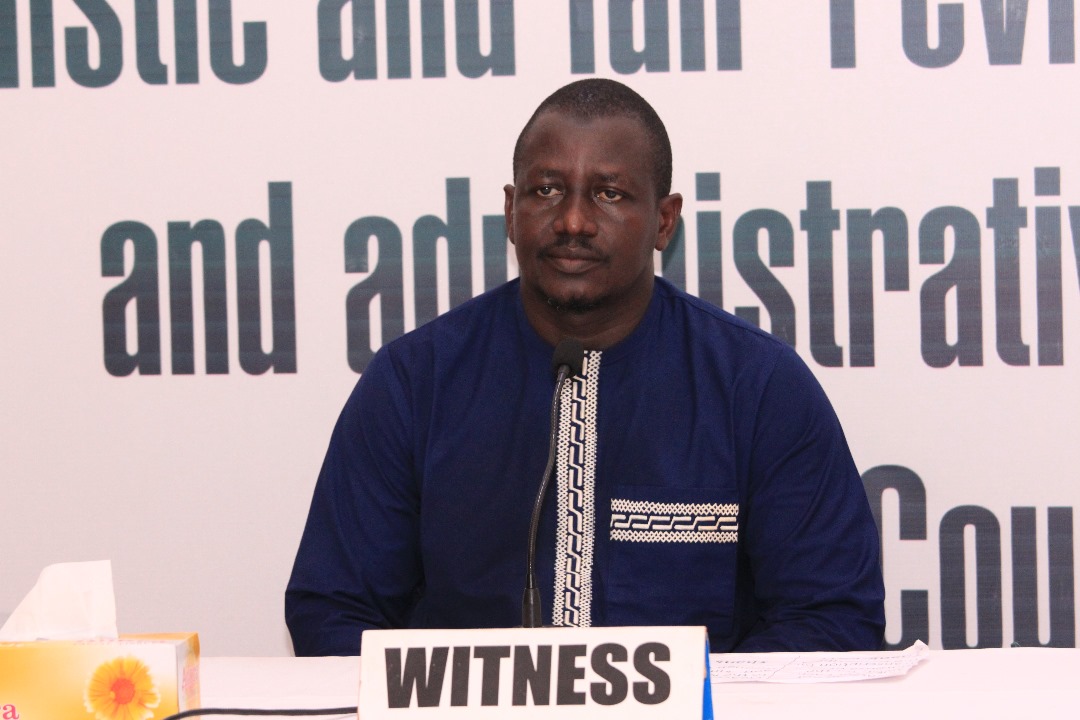Gambiaj.com – (Banjul, The Gambia) – Landing B. Sanneh, Chairman of the Mansakonko Area Council, admitted to widespread internal control weaknesses and procedural failings under his leadership during his testimony before the Local Government Commission of Inquiry on Monday.
Sanneh, who has held the position since 2018 and was re-elected in 2023, appeared as part of the Commission’s ongoing probe into governance, accountability, and financial management practices within local councils across The Gambia. His written statement, dated 10 November 2023, was formally entered into evidence during the session.
During his testimony, Sanneh acknowledged that the council had taken out various loans and overdrafts—some without his prior knowledge—primarily to cover staff salaries.
He disclosed that smaller financial transactions were often executed by the Chief Executive Officer (CEO) and Finance Director without due transparency. Lead Counsel Patrick Gomez criticized these practices, noting they breached financial regulations and exposed the council to serious liabilities. Sanneh concurred.
Although he claimed to be familiar with both the Local Government Finance and Audit Act and the Financial Manual for Councils, Sanneh revealed that from 2018 to 2023, the council lacked formal documentation defining expenditure approval limits.
“From 2024, we have documented the thresholds, and now it is being applied as required by law,” he said, attributing previous shortcomings to the absence of clear guidelines.
The inquiry also probed budgeting procedures. While Sanneh described a consultative budgeting process involving department heads and the CEO, he admitted that ward development committees—chaired by elected councillors—were not formally included.
He said minutes of meetings, including audit discussions, were occasionally recorded and offered to submit them.
In response to concerns over conflict of interest in tax collection, Sanneh confirmed that the same personnel assessed properties and collected taxes, which violates best practices. He said he had ordered a rotation of staff, but Lead Counsel Gomez noted the directive was neither enforced nor followed up.
The Commission raised further concerns about inadequate internal auditing. Sanneh conceded that most payments were made without pre-approval by internal auditors, blaming a weak “work culture.” However, he claimed reforms were underway, including monthly account reconciliations, regular meetings with the finance unit, and improved audit compliance.
Sanneh also acknowledged that council vehicles had been auctioned off without a proper valuation by the Gambia Public Procurement Authority (GPPA) and that some were sold to staff for as low as D100,000.
He said the council approved the auction “in principle” but left the operational process to staff. Lead Counsel Gomez strongly condemned the practice, citing it as a clear conflict of interest. “The person selling is the person buying,” he said, suggesting disciplinary measures were warranted. Sanneh responded that the council had instead focused on recovering outstanding payments from the auction.
The chairman distanced himself from a separate scandal involving former Finance Director Bai Gibbi Sillah, who allegedly used privately printed receipt books to collect D1.8 million in revenue. Thirteen official receipt books are reportedly missing. Sanneh denied any knowledge of these irregularities.
Other disclosures during the hearing included the council’s acquisition of two plots of land in Soma for over D100,000 each, held as long-term investments, and the existence of a special account for COVID-19 relief funds received from the Israeli Embassy—an account that has not yet been audited.
When pressed by Commission Chair Jainaba Bah on the council’s failure to draft Standing Orders or seek legal drafting assistance from the Ministry of Justice, Sanneh replied, “We could have done that, but we did not do that. It is a lapse on our side.”
He attributed many of the council’s early deficiencies to systemic challenges, including a poorly qualified workforce. “When I was elected in 2018, only one staff member had an HND. Most had just a high school education or none at all,” he explained. He added that the council now boasts a better-qualified staff, including individuals with master’s and bachelor’s degrees and relevant certifications.
Sanneh concluded his testimony by asserting that the council has embarked on a new phase of institutional reform. “Now there is pre-auditing and post-auditing, monthly accounts reconciliation, and monthly engagement with the finance unit,” he said, pledging a continued commitment to governance improvements.
Chairman Sanneh is scheduled to reappear before the Commission on 22 July 2025.










